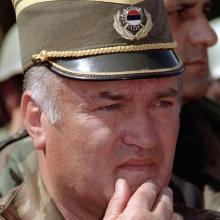
As the Serbs advanced, refugees fled north to the main Dutch base in Potocari.
Bosnian Serb commander Ratko Mladic, nicknamed the "Butcher of Bosnia", demanded the Bosniaks disarm to save their lives.
On July 12, about 15,000 Bosniak men of military age broke out of the enclave. They were shelled as they fled through the mountains. Some were killed after surrendering.
Buses then deported an estimated 23,000 women and children to Bosniak territory while the Serbs separated out all males aged between 12 and 77.
The next day, the first killings of unarmed Bosniaks took place in the nearby village of Kravica. During the next few days, 8000 Bosniak men and boys were murdered by Bosnian Serbs at sites around Srebrenica.
Now, more than 20 years later, Mladic has been sentenced to life imprisonment after being convicted of genocide, war crimes and crimes against humanity.
Right until the end, Mladic was attempting to disrupt proceedings and delay the sentencing, while at the same time still threatening witnesses by drawing his hand across his throat in a slashing motion.
The trial in The Hague took 530 days across more than four years and is said to be the most significant war crimes case in Europe since the Nuremberg trials, mainly because of the scale of the atrocities.
Nearly 600 people gave evidence for the prosecution and defence, including survivors of the conflict.
The speed of news cycles now means people may have forgotten the images of bodies being pulled out of mass graves after being discovered by those searching for proof of the killings.
In the West, Mladic is seen as just another brutal leader in a troubled area of the world where wars have been fought since time immemorial.
What makes this case so important is the determination of the Serbs to brutally erase Bosniaks from the face of the earth. Separating boys and men from their families means only one thing — extermination of a race.
However, despite the sentencing, the war is still not over for many.
Not only are the victims still mourning the loss of family members — one woman is quoted as having lost 50 of her family — Mladic supporters, and there are still many, are vowing to carry on his so-called vision.
In the Serbian village where Mladic was arrested in 2011, residents dismissed the guilty verdicts as biased.
A native of Sarajevo, who became a teenage soldier to defend the city during the siege, says they are still fighting the legacy of the war.
Once Mladic has exhausted any appeals, he could, theoretically, be sent to the United Kingdom to serve out the rest of his life behind bars. Britain is one of the countries signed up to the tribunal’s agreement of the enforcement of sentences.
The verdict is described as a momentous victory for justice. Whether it is a lasting victory will be tested in the appeals process.
Mladic is not alone in ordering genocide or committing war crimes. Right now, Rohingya Muslims, much like Bosnian Muslims, are facing genocide and displacement. In the Middle East it is Muslim against Muslim, and the West versus Russia for control of some strategic cities and towns.
There is hope the people perpetuating death and destruction will finally face justice, but it seems distant some days. It seems an age since Mladic attempted to eradicate a race because of religion. The world should not have to wait 20 years before other butchers face justice.












